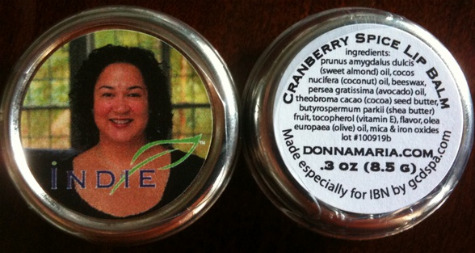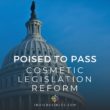Yesterday, the House approved HR 5297: The Small Business Jobs and Credit Act, a $42 billion bill to aid “small” businesses. It includes a $30 billion Small Business Lending Fund, and is expected to be signed into law by President Obama in short order.

I love the idea of a new law to help businesses thrive. But we all know that a bill's name rarely reflects its real life practical effect. (See this bill, for example.) Giving $30billion to community banks to lend to local businesses will not help “real” small businesses. You know, the ones on the much talked about “Main Street.” It won't help people like Emily Caswell of GCDSpa in Topsham, Maine.
Emily makes bath and body care products by hand. Her specialty is customizing lip balms for special occasions. At my request, Emily customized 100 of the pictured quarter-ounce lip balms for me in Cranberry Spice (a custom scent for me) to celebrate the fall season. I plan to gift them to clients and friends to promote the capabilities of my IBN members. As you can see, my image and the Indie logo grace the lid label, and the back label contains an ingredient listing, my website address and a notation that the balms were “Made especially for IBN by gcdspa.com.”
When passed, HR 5297 won't help people like Emily because Emily doesn't want a loan. Like many Indies, she is building her family business wealth slowly. She doesn't want to go into debt at this time, and she doesn't want to turn over ownership of her business in exchange for the ability to grow faster. She's what I call a “consumer-business owner,” and HR 5297was not designed with them in mind.
About Emily
Emily has been a member of IBN since 2006. In this 2009 article from Indie Archives, I interviewed Emily about her business. Nearly two years later, GCD Spa is today going strong and growing, and Emily is fast becoming the company of choice for people who want customized lip balms to commemorate special occasions.
Here's an update on Emily and how her business has grown over the past two years — with no small business loans and no employees except her, her husband and the help of family members and friends when needed.
The Launch
 Emily launched Graham-Caswell Design, LLC in 2005. Before launching her business, she was employed as a graphics designer. She started her company in part because she wanted to be more available to her husband and two children, aged 10 and 12. Emily also realized that she could put her design expertise to good use designing her own cosmetics labels and also customizing designs to match the customized products she makes for wedding showers, bridal parties, anniversary celebrations and other special occasions.
Emily launched Graham-Caswell Design, LLC in 2005. Before launching her business, she was employed as a graphics designer. She started her company in part because she wanted to be more available to her husband and two children, aged 10 and 12. Emily also realized that she could put her design expertise to good use designing her own cosmetics labels and also customizing designs to match the customized products she makes for wedding showers, bridal parties, anniversary celebrations and other special occasions.
What Emily Makes
Ninety percent of Emily’s products are customized to order and sold only once, and only to the customer who purchases them. Emily’s business requires her to respond to her customers on a moment’s notice. For example, one customer ordered lip balm favors for a bridal shower and requested her friend's favorite drink flavor.
Emily’s stock lip balm line did not include that flavor, but after an inventory check, she was able to formulate a suitable flavor just for the client, and just in the nick of time for the shower party. This type of custom work is a special service Emily offers, and one that many customers request regularly.
Earlier this year, Emily took on her first “back bar” customer, a luxury hotel in Beverly Hills, Ca, which now uses her products on clients in their exclusive spa. She also landed her first wholesale account, which buys customized products for sale in a retail store in upstate New York.
In addition to making great products, Emily is a super fun person, as evidence by this guest blog post and her own blog.
Emily Would Not Take Out A Small Business Loan
When I asked Emily whether she would take out a loan, she said this:
NO, I would not take out a loan. That may help other small businesses, but I've never considered it. I have always bootstrapped my business, figuring that it grows at the rate I can handle it if I reinvest in myself and expand as I can afford to. Of course, I'm in a different position than other small businesses because we don't rely solely on my income to support my family. I'm sure each business is different. But no, for me the loans are not as big an issue as over regulation.
Emily Is Not Alone
For a story reiterating how other consumer-business owners don't want loans, even with President Obama’s new plans, read this August 2010 Wall Street Journal article about entrepreneurs Erica Duignan Minnhan and Susan Reiner, who said they “wouldn’t take out a bank loan if President Obama delivered it on a silver platter.”
Emily Is Growing!
Last year, Emily and her business were featured in Good Housekeeping Magazine. In May of this year, Emily and her husband began construction on an addition to their home, that is expected to become Emily’s manufacturing area. In the depressed economy in her town, Emily has hired electricians, plumbers and woodworkers to built out her manufacturing so she can grow her business.
I am thrilled to see that Emily's business is growing. She's recently been featured in a number of other women's and wedding magazines. Her slow but steady growth has been good for her, good for her family, good for her community, good for the local economy, and good for America. Emily serves customers all over the nation and I am proud and honored to be one of them.
HR 5297 Won't Help People Like Emily
HR 5297 is well intended. But “Small Business Jobs” in the name of the bill is aimed at jobs that don't include people like Emily — the actual owner of the business — and those are the jobs that need to be addressed now.
The bulk of businesses that will benefit from this bill are not really “small.” They are larger businesses that can afford to hire several employees and/or that have the collateral or personal credit that's necessary to secure a small business loan these days.
Those businesses are important, but they are not “small.” The definition of small has changed, and our government policies must now change with it.
The real Main Street economy is composed of consumer-business owners, artisans, crafters, Indies and family business leaders. These business owners make up the real Main Street. They are often not in a position to hire anyone, but they have hired themselves and that counts too! They don't want mortgage their homes, their children's college fund or their own 401Ks to build a business faster — and they should not have to.
As alluded to by Emily above, the challenge for the real Main Street is that the government is not in tune with how new laws, rules, regulations, paperwork, registration requirements, testing requirements, and other unnecessary and burdensome requirements are slowly strangling them to death. These are the issues Main Street is dealing with, and it's time to address them. Seriously.
People like Emily helped to bail out banks, the automotive industry, and the nation's “not so small” small businesses, and they've done so without complaining. Now, it's time to empower them, financially and otherwise, to achieve their full potential as the leaders of their families and their businesses.
It's time to look at newly introduced bills as more than just affecting businesses. It's time to look at them as affecting consumer-business owners on Main Street — men and women who are losing their jobs, but working hard in jobs of their own creation. They are holding it together in a tough economy, and they should be recognized and rewarded for that.
So, Mr. President, with all due respect, is it Main Street's turn yet?
I posed a similar question to the administrator of the US Small Business Administration yesterday in a post via the American Express OPEN Forum.
Question: What do you think?



